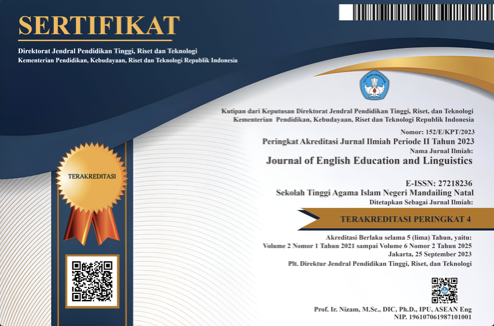KAHOOT! IN TEACHING VOCABULARY TO SEVENTH GRADERS OF JUNIOR HIGH SCHOOL
DOI:
https://doi.org/10.56874/jeel.v5i1.1738Keywords:
Effectiveness, Kahoot!, VocabularyAbstract
The research investigates Kahoot!'s effectiveness in teaching vocabulary to junior high school pupils. According to observation by the researcher at a private Islamic junior high school, English language learners frequently struggled with vocabulary deficiency when learning English. In addition, the teacher frequently referred to textbooks, which was tiresome and repetitive for seventh-grade students. A promising way to address these issues was to deploy the educational platform termed Kahoot! The end goal of the present research was to ascertain whether or not Kahoot! showed its effectiveness in vocabulary teaching to junior high school seventh graders. The study utilized a quantitative methodology and was designed as a quasi-experimental design with a pre-test and a post-test as instruments. An independent sample t-test was applied. This research focused on sixty students as the subjects. Based on the data analysis, a statistically significant distinction was proven by the p-value= .000. The experimental group exhibited supreme performance with a score of 76.5 in contrast to the control group with only 55.5. The score for the effect size of teaching vocabulary using Kahoot about directions material was 0.5, showing a large effect. It can be inferred that Kahoot! demonstrates its effectiveness in teaching vocabulary to seventh graders of junior high school.
References
Ahmed, A. A. A., Sayed, B. T., Wekke, I. S., Widodo, M., Rostikawati, D., Ali, M. H., Abdul Hussein, H. A., & Azizian, M. (2022). An Empirical Study on the Effects of Using Kahoot as a Game-Based Learning Tool on EFL Learners’ Vocabulary Recall and Retention. Education Research International, 2022.
Amalia, I., Solihat, D., & Darsih, E. (2022). the Effect of Kahoot Application in Improving Students’ Wirting Skill (Quasi Experimental Design At Sman 1 Luragung). Indonesian Journal of Learning and Instruction, 5(1), 23–30.
Aprilia, A., Sulistyaningsih, S., & Musyarofah, L. (2023). The Use of Kahoot to Improve Students’ Narrative Text Reading Comprehension. International Journal of English and Applied Linguistics (IJEAL), 3(2), 100–108.
Asrida, E., Syafitri, W., Sakti, G., & Dewi, M. P. (2024). the Correlation Between Students’ Vocabulary Mastery and Their Listening Ability. ELP (Journal of English Language Pedagogy), 9(1), 66–75.
Cahyaningtyas, M., & Chakim, N. (2023). Revealing EFL Students’ Perception towards the Implementation of Kahoot! In Learning Narrative Text at the Secondary School Level. Prosodi, 17(1).
Elvyra, E., & Pratiwi, T. L. (2023). The Effect Of Using Kahoot In Writing Functional Text For. ENGGANG: Jurnal Pendidikan, Bahasa, Sastra, Seni, Dan Budaya, 3(2).
Katemba, C. V., Tobing, J. H. L., & Putri, T. A. (2022). Do Kahoot ! Games Enhance Vocabulary Learning? Journal of Elementary Education, 15(3), 393–408.
Kusumayanthi, S., & Rusmiyati, M. (2021). Students’ Engagement In Learning English Vocabulary Via Games In Kahoot! English Journal Literacy UTama, 6(1), 444–452.
Mahbubah, L., & Anam, S. (2022). Students ’ Perceptions On The Implementation Of Kahoot ! In English Language Teaching. Lingua Scientia, 29(1), 23–32.
Maesaroh, R. S., & Reknosari. (2021). The Effect Of Vocabulary Mastery On Students’ Writing Skill (Research On Grade Viii Students At Smp Negeri 46 Jakarta). JEdu: Journal of English Education, 1(3), 160–164.
Mansur, M., & Fadhilawati, D. (2019). Applying Kahoot to Improve the Senior High School Students ’ Vocabulary Achievement. VELES Voices of English Language Education Society, 3(2), 164–173.
Mishra, P., Pandey, C. M., Singh, U., Gupta, A., Sahu, C., & Keshri, A. (2019). Descriptive Statistics and Normality Tests for Statistical Data. Annals of Cardiac Anaesthesia, 22(1), 67–72.
Pallant, J. (2020). JSPSS Survival Manual-Open University Press (2020). Open University Press.
Pratiwi, R., Susilawati, E., & Wardah, W. (2020). Improving Students ’ Mastery Of Simple Present Tense In Descriptive Text By Using Kahoot ! Game. Journal of English Education Program, 1(2), 73–86.
Quiroz, M. F., Gutiérrez, R., Rocha, F., Valenzuela, M. P., & Vilches, C. (2021). Improving English Vocabulary Learning through Kahoot !: A Quasi- Improving English Vocabulary Learning Through Kahoot !: A Quasi-Experimental High School Experience. Teaching English with Technology, 21(2), 3–13.
Rahmah, N., Tahir, M., & Talib, A. (2023). Articles The Effect Of Vocabulary Mastery On Students ’ Reading Comprehension. International Journal of Business, English, and Communication (IJoBEC), 1(1), 36–44.
Syahputri, H. R., & Solo, L. (2022). The Effect Of Using Kahoot ! Application On Students ’ Vocabulary. Dialectical Literature and Education Journal(DLEJ), 7(1).
Taslim, T., Asrifan, A., Chen, Y., & NR, N. (2019). Correlation Between Student’S Vocabulary Mastery and Speaking Skill. Journal of Advanced English Studies, 2(2), 65.
Downloads
Published
Issue
Section
License
All articles published in the Journal of English Education and Linguistics are licensed under a Creative Commons Attribution-ShareAlike 4.0 International (CC BY-SA) license. This means anyone is free to copy, transform, or redistribute articles for any lawful purpose in any medium, provided they give appropriate attribution to the original author(s) and Journal of English Education and Linguistics, link to the license, indicate if changes were made, and redistribute any derivative work under the same license.
Copyright on articles is retained by the respective author(s) without restrictions. A non-exclusive license is granted to the Journal of English Education and Linguistics to publish the article and identify itself as its original publisher, along with the commercial right to include the article in a hardcopy issue for sale to libraries and individuals.
Although the conditions of the Creative Commons Attribution-ShareAlike 4.0 International (CC BY-SA) license do not apply to authors (as the copyright holder of your article, you have no restrictions on your rights), by submitting to the Journal of English Education and Linguistics, authors recognize the rights of readers and must grant any third party the right to use their articles to the extent provided by the license.

This work is licensed under a Creative Commons Attribution-ShareAlike 4.0 International License.








